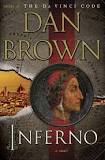 Having recently completed Dan Brown’s new thriller Inferno, I’m reminded how much more pessimistic I am regarding the likelihood of survival for humankind in the future. In addition to extreme over-population of our planet (one of the central themes of Inferno, and a significant factor in any discussion of crime, global warming, environmental degradation, among many other challenges we face together globally), unbridled greed, privilege, and control in the hands of the wealthiest and most powerful individuals and corporations continues to exacerbate the wide gulf between the haves and have-nots throughout the world.
Having recently completed Dan Brown’s new thriller Inferno, I’m reminded how much more pessimistic I am regarding the likelihood of survival for humankind in the future. In addition to extreme over-population of our planet (one of the central themes of Inferno, and a significant factor in any discussion of crime, global warming, environmental degradation, among many other challenges we face together globally), unbridled greed, privilege, and control in the hands of the wealthiest and most powerful individuals and corporations continues to exacerbate the wide gulf between the haves and have-nots throughout the world.
It feels like the nightmares from George Orwell’s novels Animal Farm and 1984 are becoming far too real. Who in the U.S. Congress concluded it would be a good idea for banking industry lobbyists to draft legislation to soften financial regulations after the banking industry wreaked havoc on the world economy?
Consider the thoughts of Chris Hedges in his article “Rise Up or Die,” as reported on Bill Moyers’ website:
Corporations write our legislation. They control our systems of information. They manage the political theater of electoral politics and impose our educational curriculum. They have turned the judiciary into one of their wholly owned subsidiaries. They have decimated labor unions and other independent mass organizations, as well as having bought off the Democratic Party, which once defended the rights of workers. With the evisceration of piecemeal and incremental reform — the primary role of liberal, democratic institutions — we are left defenseless against corporate power.
Hedges concludes, “It is time to build radical mass movements that defy all formal centers of power and make concessions to none. It is time to employ the harsh language of open rebellion and class warfare.”
I believe in peace. I do not believe in violence. Yet with the feeling that humanity is hurtling toward the ultimate abyss faster than most of us dare to imagine, I find myself feeling sympathy for those employing radical means to confront the horrors we face in the future of our world; both the fictional choice made by the villain in Inferno, and the very real choices made by real-life villains in Washington D.C. and other seats of power around the world.
Though I found Inferno a little frustrating in terms of the writing and continuity, and reviews are mixed, it is a fast-paced page turner that I recommend to others. I wonder how many others, considering the horrible mess in which we find ourselves these days, will sympathize with the villain?
